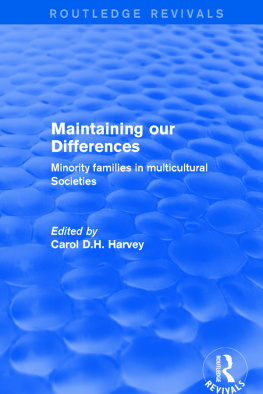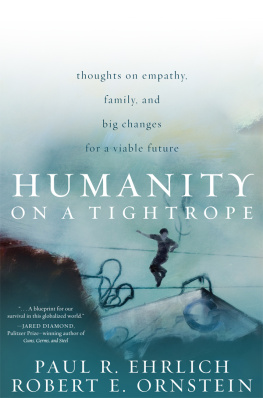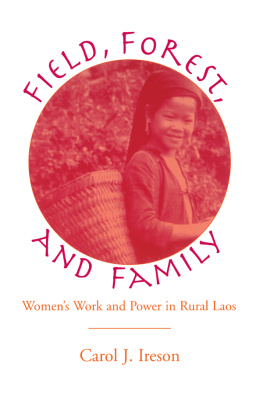Walking a Tightrope: Meeting the Challenges of Work and Family
For Mahlon, Kay, Jim and Liz, who know how it is to balance work and family, and for Olivia, who is learning
First published 2000 by Ashgate Publishing
Reissued 2018 by Routledge
2 Park Square, Milton Park, Abingdon, Oxon, OX14 4RN
711 Third Avenue, New York, NY 10017, USA
Routledge is an imprint of the Taylor & Francis Group, an informa business
Copyright Carol D.H. Harvey 2000
All rights reserved. No part of this book may be reprinted or reproduced or utilised in any form or by any electronic, mechanical, or other means, now known or hereafter invented, including photocopying and recording, or in any information storage or retrieval system, without permission in writing from the publishers.
Notice:
Product or corporate names may be trademarks or registered trademarks, and are used only for identification and explanation without intent to infringe.
Publishers Note
The publisher has gone to great lengths to ensure the quality of this reprint but points out that some imperfections in the original copies may be apparent.
Disclaimer
The publisher has made every effort to trace copyright holders and welcomes correspondence from those they have been unable to contact.
A Library of Congress record exists under LC control number: 99085926
ISBN 13: 978-1-138-70526-5 (hbk)
ISBN 13: 978-1-315-20227-3 (ebk)
Contents
Johanna Lammi-Taskula, Finland
Mikael Nordenmark, Sweden
Joris Ghysels, Belgium
Ria Smit, South Africa
Chin-Chun Yi, Yu-HsiaLu, and Yun-Kang Pan, Taiwan
Karen A. Duncan, Canada
Carol D. H. Harvey, Canada
Guide
Karen A. Duncan, Ph. D., is Assistant Professor, Department of Family Studies, Faculty of Human Ecology, University of Manitoba, Winnipeg, Canada. She specialises in family resource management.
Joris Ghysels is a doctoral student in economics and a teaching assistant in the Faculty of Political and Social Sciences, Antwerp University, Belgium. He is interested in family sociology and household economics and is preparing a Ph. D. on household labour decisions.
Carol D.H. Harvey, Ph. D., is Professor, Department of Family Studies, Faculty of Human Ecology, University of Manitoba, Winnipeg, Canada. She studies family interaction, particularly in middle and old age.
Johanna Lammi-Taskula is a researcher at STAKES, National Research and Development Center for Welfare and Health, Helsinki, Finland. She is interested in gender studies, especially in critical studies on men.
Mikael Nordenmaik, Ph. D., Department of Sociology, Umea University, Umea, Sweden. His research interests include labour market, family life and gender and the relationships among these factors.
Ria Smit is a lecturer, Department of Sociology, Rand Afrikaans University, Auckland Park, South Africa. She is interested in cross-cultural family research, especially family members percepticms of their family roles within the context of their specific cultures.
Chin-Chun Yis research interests include family structure, conjugal interaction, females domestic status, and familism in private enterprises. Yu-Hsia Lus recent study is on womens work in a small family business; Yun-Kang Pan has worked on family related issues. All three are at the Institute of Sociology, Academia Sinica, Taipei, Taiwan.
While listening to presentations by members of the Committee on Family Research (RC-06), The International Sociological Associations XTV Congress in Montreal, held in July 1998, I thought about the complicated relationships between work and family. Our lively discussions in Montreal inspired me to bring some of that research to a wider audience. Both Barbara Settles, University of Delaware, and Kate Trew, Ashgate Publishers, London, encouraged me to put the papers into a book format - and this book is the result. Readers can now continue the debate on work and family balance.
I wrote to authors who were in Montreal to get their co-operation to have their work published here. are all being published for the first time, and they all represent original research. During the editing process, authors received many questions from me, and their co-operation and prompt replies are appreciated.
The role of workplace location was not fidly explored by the authors of , and to the editor of the Canadian Home Economics Journal, for permission to reprint the work here.
Editing takes time, space and equipment. I am grateful to the University of Manitoba for sabbatical time and use of equipment. Thanks also to Mildred Oye for typing correspondence. I also enjoyed time as a Research Associate at the International Social Science Institute, University of Edinburgh. Thanks to staff at the Institute for time, space and equipment. Thanks also to reviewers of the proposal of this book for helpful suggestions.
Production assistance was supplied by Pauline Chambers, Ile-des-Chenes, Manitoba. Her cheerful manner and her technical expertise makes editing much easier. Thank you.
Kate Trew and Kirsten Howgate from Ashgate Publishers, along with others in London, made this book possible. Thank you for your support.
Finally, my own family has walked a tightrope of the challenges between work and family. My husband Mahlon has been particularly supportive both emotionally and financially in making this book a reality.
- C. D.H. Harvey, Editor
CAROL D.H. HARVEY
Family members, particularly women, are walking a tightrope between the demands of work and family. While cultural traditions favour patriarchy, with a greater domestic role for women than men, social change exerts pressure on all sides. As we shall learn here, women who work for wages are influenced by the cultural ethos in which they live, men who live in societies with equalitarian social policy still do not take advantage of paternal leave, and unemployed men do not do as much household work as unemployed women. Modern societies seek to provide a level playing field for both male and female workers, but traditional values and divisicm of labour within families still exists.
The chapters of this book show the duality of contemporary families, responding to workplace changes and still providing cultural continuity. A modified patriarchal framework (Harding, 1996) appears to fit with the results of the research in this volume. The work presented here uses data from Europe, Africa, Asia and North America. In Europe the countries of Finland, Sweden, Denmark, Belgium, and Spain are studied; in Africa, South Africa; in Asia, Taiwan and China; in North America, Canada.
It is interesting that all the authors report effects of workplace change on family life, while at the same time noting the effects of traditional values and behaviour. In the first chapter, Johanna Lammi-Taskula of Finland reports on a study of the changing nature of gender relationships using fathers of young children as examples. Combining quantitative and qualitative techniques, she observes gendered negotiations. Lammi-Taskula notes that fathers are helped by a favourable family policy in Finland which provides for paternal leave at the birth or adoption of a child. Very few Finnish fathers take the paternal leave to which they are entitled. They are also less certain than women that their bosses will approve staying home with a sick child. They report feeling a time pressure which paternity and family leaves are supposed to alleviate, and yet they hesitate to take them.













